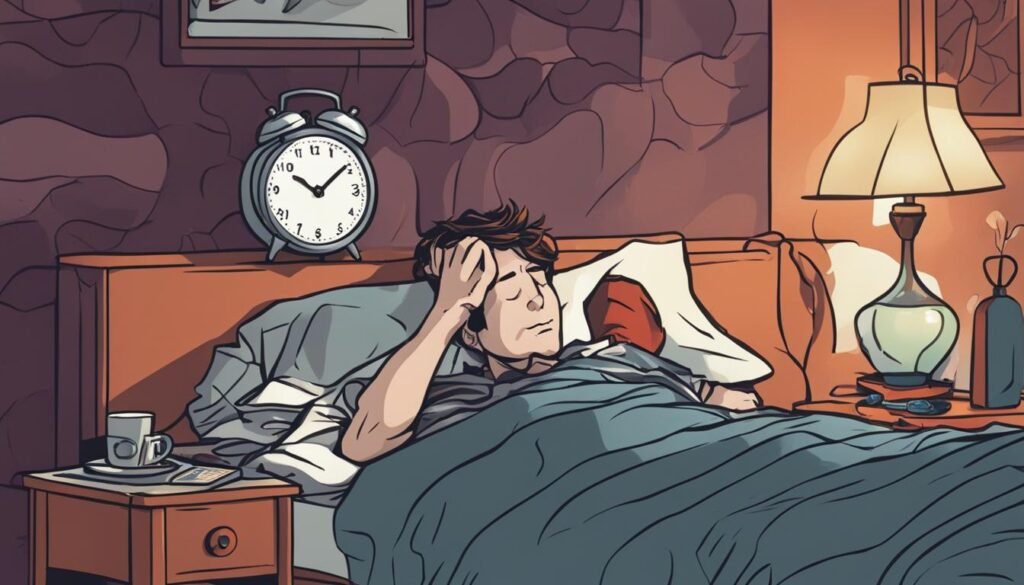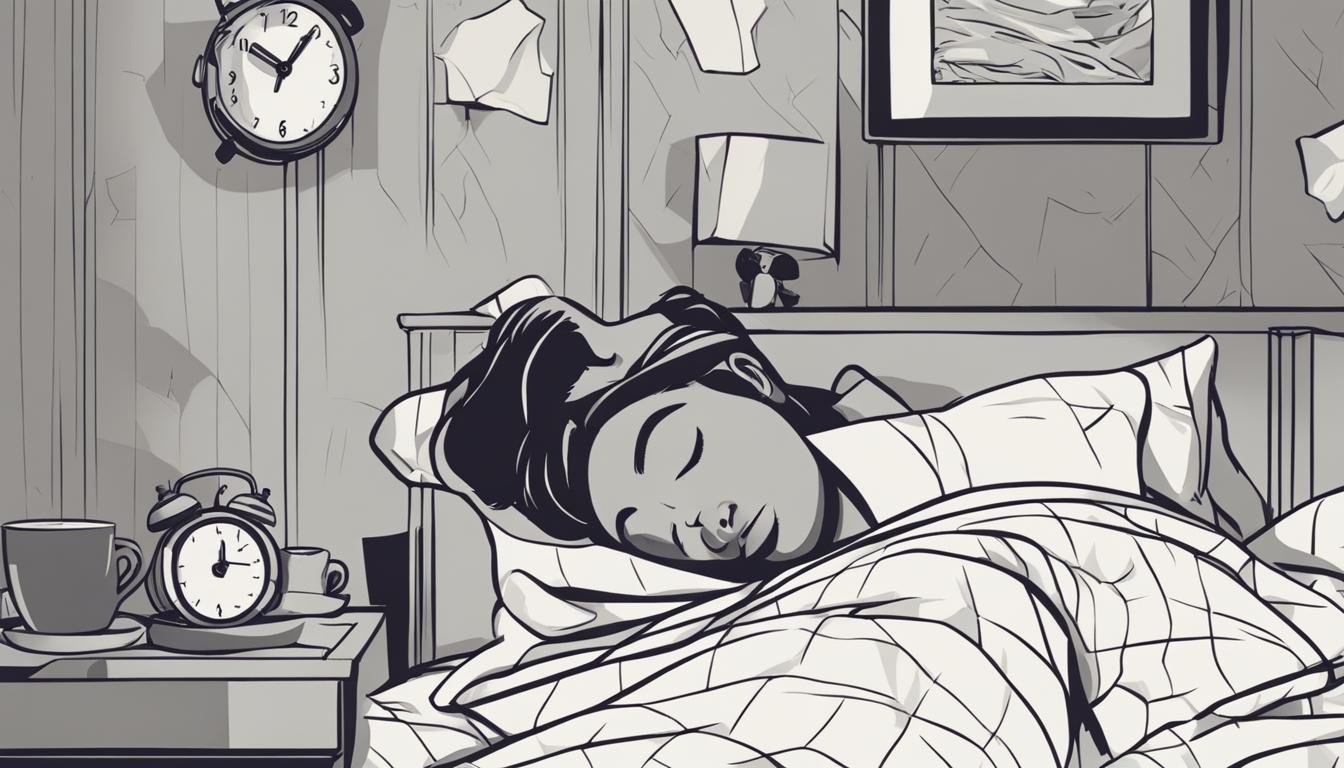Waking up after a nap with a headache can be frustrating and ruin the day. Understanding the causes of post-nap headaches can help prevent them. Factors such as snoring, sleep apnea, teeth grinding, poor sleep hygiene, dehydration, muscle tension, excessive caffeine, and allergies can all contribute to headaches after napping. Taking steps to address these factors, such as using remedies for snoring and sleep apnea, practicing relaxation techniques for teeth grinding, improving sleep environment and habits, staying hydrated, reducing caffeine consumption, and managing allergies, can help alleviate or avoid post-nap headaches.
Key Takeaways:
- Post-nap headaches can be caused by various factors, including snoring, sleep apnea, teeth grinding, poor sleep hygiene, dehydration, muscle tension, excessive caffeine, and allergies.
- Addressing these factors through remedies, lifestyle changes, and self-care practices can help alleviate or prevent post-nap headaches.
- Consider using snoring remedies, sleep apnea treatments, relaxation techniques, and improving sleep environment and habits to reduce the risk of post-nap headaches.
- Staying hydrated, reducing caffeine consumption, and managing allergies can also be beneficial in preventing headaches after napping.
- Prioritize good sleep hygiene, make necessary adjustments to your sleep environment, and practice healthy sleep habits to promote better sleep and reduce the likelihood of post-nap headaches.
Snoring and Sleep Apnea
Snoring and sleep apnea can be contributing factors to headaches after napping. Snoring, characterized by the vibration of tissues in the airway during sleep, can lead to decreased oxygen levels in the blood, which may result in headaches upon waking. Sleep apnea, a sleep disorder characterized by interrupted breathing during sleep, can also cause headaches after napping.
It is important to address snoring and sleep apnea to alleviate headaches associated with these conditions. Remedies such as mouth guards and nose bandages can help reduce snoring, and lifestyle changes or breathing devices may be effective in managing sleep apnea. By addressing these underlying issues, individuals can experience relief from post-nap headaches caused by snoring and sleep apnea.
Headache from Snoring
Snoring can cause decreased oxygen levels in the blood, leading to headaches upon waking. Remedies such as mouth guards and nose bandages can help reduce snoring and alleviate the associated headaches after napping.
Sleep Apnea and Headaches
Sleep apnea, characterized by interrupted breathing during sleep, can also result in headaches after napping. Lifestyle changes or breathing devices can effectively manage sleep apnea and help relieve post-nap headaches.
Teeth Grinding (Bruxism)
Teeth grinding, also known as bruxism, is a common cause of headaches after napping. This condition involves clenching or grinding your teeth, often during sleep, which can lead to tension in the jaw muscles and result in head and tooth pain. Bruxism can be caused by various factors, such as stress, anxiety, misaligned teeth, or an abnormal bite.
While occasional teeth grinding may not cause significant issues, chronic bruxism can lead to headaches and dental problems. If left untreated, it can cause tooth sensitivity, worn-down enamel, jaw disorders, and even temporomandibular joint (TMJ) disorders. If you frequently wake up after napping with a headache, teeth grinding could be the underlying cause.
To alleviate headaches caused by teeth grinding after napping, there are several strategies you can try. One effective approach is practicing relaxation techniques, such as deep breathing exercises and meditation, to reduce stress and tension. Additionally, using a mouthguard specifically designed for bruxism can help protect your teeth and prevent further damage caused by grinding. It’s also essential to reduce stimulants like caffeine and alcohol, as they can contribute to teeth grinding.
Furthermore, adopting good sleep habits and managing stress levels can help alleviate bruxism-related headaches. Creating a calm and comfortable sleep environment, maintaining a regular sleep schedule, and implementing stress-reducing activities before bedtime can all contribute to better sleep quality and reduce the likelihood of teeth grinding and subsequent headaches.
Poor Sleep Hygiene
Having poor sleep hygiene can contribute to headaches after napping. Your sleep environment, sleep habits, and quality of sleep all play a role in how you feel when you wake up.
First, let’s talk about your sleep environment. Using the wrong pillow or mattress can lead to discomfort and ultimately result in post-nap headaches. Ensuring that you have a comfortable and supportive sleep surface is essential. Additionally, sleeping in uncomfortable positions can strain your muscles and cause tension headaches. Finding a position that allows your body to relax and align properly can help prevent headaches.
Your sleep habits also play a significant role in how you feel after a nap. Sleeping too much or too little can disrupt your sleep-wake cycle and lead to headaches. It’s important to aim for a consistent and adequate amount of sleep each night. Avoiding excessive daytime napping can also help regulate your sleep patterns and reduce the risk of post-nap headaches.
By prioritizing good sleep hygiene, making adjustments to your sleep environment, and practicing healthy sleep habits, you can promote better sleep quality and decrease the likelihood of experiencing headaches after napping.

Dehydration and Nutrition
Dehydration and hunger can both contribute to headaches after napping. When the body lacks sufficient water, it can lead to dehydration, which often manifests as a headache. Similarly, skipping meals or not consuming enough nutrients can trigger hunger headaches. These headaches can be quite uncomfortable and hinder productivity.
To prevent headaches caused by dehydration, it is important to stay hydrated throughout the day. Make sure to drink an adequate amount of water and avoid excessive consumption of energy drinks and sodas. Sipping water regularly can help maintain hydration levels and reduce the risk of post-nap headaches. Additionally, it is beneficial to have a light snack or meal before napping to prevent hunger headaches.
Proper nutrition is key to avoiding headaches after napping. Make an effort to eat regular, balanced meals that provide the necessary nutrients to keep your body fueled. Skipping meals can lead to low blood sugar levels, which can trigger headaches. By prioritizing good nutrition and making sure your body is properly nourished, you can reduce the frequency of headaches after napping.
Muscle Tension
One of the common causes of headaches after sleeping is muscle tension. When the muscles in the neck and scalp become tense, it can result in a throbbing headache. There are several factors that can contribute to muscle tension, including poor sleep positions, prolonged desk work, long periods of driving, and even tensions from teeth grinding during sleep. This muscle tension can persist even after waking up from a nap, causing discomfort and disruption to your day.
To alleviate muscle tension and reduce headaches after napping, there are several techniques you can try. Regular stretching exercises can help relax the muscles and relieve tension. Incorporating physical activity into your routine can improve blood flow and promote muscle relaxation. Gentle massages or applying warm washcloths to the affected areas can also provide relief. Taking breaks from desk work or adjusting your posture while driving can help prevent muscle strain and reduce the likelihood of developing tension headaches after sleeping.
Preventing Muscle Tension Headaches
Preventing muscle tension headaches after napping involves adopting healthy habits and making simple lifestyle changes. Improving your sleep environment, such as using a supportive pillow and mattress, can help reduce muscle tension. Also, practicing good sleep hygiene by maintaining a consistent sleep schedule and creating a relaxing bedtime routine can contribute to better sleep quality and minimize muscle tension headaches. Additionally, managing stress levels through relaxation techniques like deep breathing or meditation can help prevent tension headaches.
Conclusion
Experiencing a headache after a nap can be a frustrating experience, but understanding the possible causes can help in preventing them. Factors such as snoring, sleep apnea, teeth grinding, poor sleep hygiene, dehydration, muscle tension, and allergies can all contribute to post-nap headaches. By addressing these factors and making necessary lifestyle changes, it is possible to alleviate or even avoid these headaches altogether.
Some practical steps that can be taken include using remedies for snoring and sleep apnea, practicing relaxation techniques to combat teeth grinding, and improving sleep environment and habits. Staying hydrated, reducing caffeine consumption, and managing allergies through appropriate measures are also effective strategies in preventing post-nap headaches.
Prioritizing good sleep hygiene and making necessary lifestyle changes are crucial in promoting better sleep quality and reducing the risk of post-nap headaches. By following these steps, you can enjoy a rejuvenating nap without the discomfort of a headache afterwards. Remember, taking care of your sleep health is essential for overall well-being.
FAQ
Why do I get a headache after I nap?
There are several factors that can contribute to headaches after a nap, including snoring, sleep apnea, teeth grinding, poor sleep hygiene, dehydration, muscle tension, and allergies.
How does snoring and sleep apnea cause headaches after napping?
Snoring can lead to decreased oxygen levels in the blood, resulting in headaches, while sleep apnea, characterized by interrupted breathing during sleep, can also cause headaches upon waking.
Can teeth grinding (bruxism) cause headaches after napping?
Yes, teeth grinding during sleep can lead to tension in the jaw muscles, resulting in head and tooth pain.
What role does poor sleep hygiene play in post-nap headaches?
Factors such as using the wrong pillow or mattress, sleeping in uncomfortable positions, and sleeping too much or too little can contribute to headaches after napping.
How do dehydration and nutrition affect post-nap headaches?
Not consuming enough water or skipping meals can result in headaches, along with other symptoms such as dry mouth, dizziness, and mood changes.
Can muscle tension cause headaches after sleeping?
Yes, muscle tension in the neck and scalp, often caused by poor sleep positions, desk work, or tension from teeth grinding, can lead to headaches after napping.
How can I prevent headaches after napping?
It’s important to address the factors that contribute to post-nap headaches, such as using remedies for snoring and sleep apnea, practicing relaxation techniques for teeth grinding, improving sleep environment and habits, staying hydrated, reducing caffeine consumption, and managing allergies.

